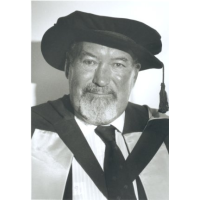Obituary - Professor Ninian Smart

Professor Ninian Smart, the pioneer of religious studies at Lancaster and founding head of department, died at the Royal Lancaster Infirmary on 29 January 2001. He leaves a widow, Libushka, and three children, a fourth having died in childhood.
The new university had deliberated long and hard about whether theology should be included in its planned academic development. Eventually it was agreed, in the words of Frank Sibley, 'to provide instruction concerning religion as such, its varieties, history and place in human life'. The tale has often been told of how the external assessor for the first appointment, a Professor Ninian Smart of the University of Birmingham, came to be the chief candidate for a post whose holder could be 'of any religion or none'; a radical approach in the late 1960s.
Ninian took up his post on 1 October 1967, supported by two assistant lecturers, the Revd. Bob Morgan and Mr Adrian Cunningham, and from that time religious studies flourished at Lancaster in all its manifestations. The outstanding teaching and research excellence of the department stand as testimony to his initial vision and his ability to inspire both staff and students. Perhaps because of the many-faceted nature of the subject, which takes as its core the study of religion in the contemporary world but draws on textual and linguistic skills, as well as in-depth knowledge of texts, doctrines and traditions, of the anthropology and sociology of religion, and of contemporary culture and society, Ninian's ability to discern inter-connections between subjects and make them tangible was an important force for the growth of interdisciplinary work at Lancaster, not only in his own department but much more widely across the institution. Without the contribution of people like him, the university would have been
far less adventurous in the second phase of its academic shaping. He encouraged the recruitment of students of all nations and faiths, particularly at postgraduate level, and was also the primary architect of the university's initial involvement in the Junior Year Abroad scheme, at a time when the concept of American students studying for a year in Britain was a novel idea.
Ninian's personal publication record was outstanding and his reputation was global: a passenger was as likely to find one of his paperbacks on some topic of faith or doctrine at Delhi as at Heathrow, and he was in constant demand as a visiting professor and similar posts. It was perhaps not surprising that the University of California at Santa Barbara was so keen to have him on its staff that he was largely able to choose his own selection of duties there, and for some time he spent six months in California and six at Lancaster, turn and turnabout.
Despite his many talents, Ninian remained mainly a commentator on the institution's affairs rather than a player at senior level, and a brief spell as pro-vice-chancellor ended in his resignation over a matter of principle. Nevertheless, successive vice-chancellors and senior officers relied heavily on him for his insight and shrewd appraisal of the contemporary university scene, and his knowledge of affairs and people was always astute and up-to-date.
A bon viveur, excellent cricketer, sometime intrepid cyclist, and devoted husband and father, Ninian lived with his wife Libushka for a long time at Westbourne House, Lancaster's first dwelling built of concrete, and one of the best parties they held was to commemorate the house's centenary. His colleagues and friends were delighted to learn that, after his many years of travel, he was returning to Lancashire and taking up residence at Over Kellett, near one of his daughters. At a deeper level, however, he has indeed returned home.